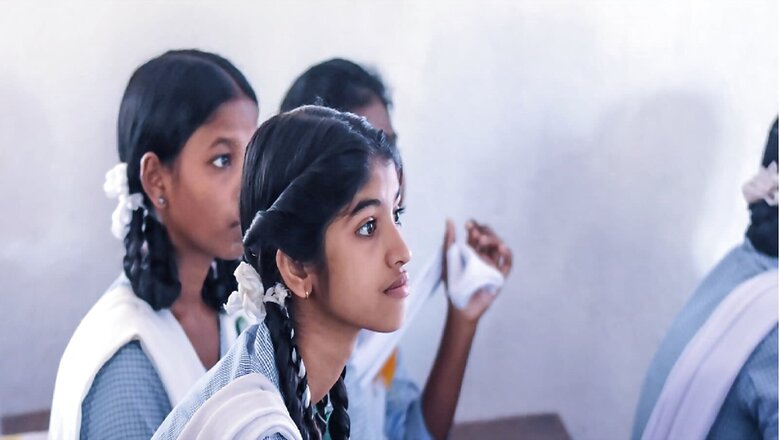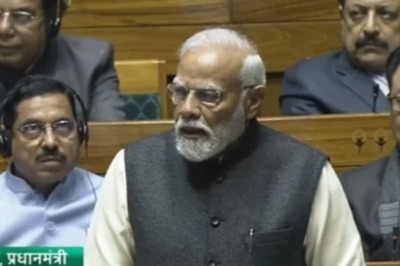
views
This may sound counterintuitive; even silly. But in an emerging nation of 1.4 billion, where tens of thousands compete for each job, amenity or opportunity, Indian children do not need to be conditioned by their parents to be more selfish, all-grabbing, and bereft of a larger view. They don’t need to be so conceitedly competitive that they become risk-averse, unimaginative, and unfit to handle personal and societal problems.
Indian children need philosophy. They must be reintroduced to the spirit of inquiry in classrooms and reconnected to the rich legacy they inherit from their wise ancestors.
It is something that the British had taken away with the English Education Act of 1835. In his zeal to Indians who were European in thought inside their brown bodies, Thomas Babington Macaulay efficiently dismantled the indigenous education system and the knowledge of Indian philosophy that it inculcated in pupils. The colonial education system—largely intact even 74 years after Independence—still produces brown, English-speaking clerks for a dead Empire.
If children are the software of the future, modern India has much smart coding to do. Introducing philosophy in schools should be one of the starting points.
Modern parents worldwide have come to think of philosophy as a waste of time. It is better to prepare children for an MBA or software engineering than to set them on the ludicrous quest of a resident philosopher’s job, they think.
But one doesn’t need philosophy to find a job. One needs philosophy to do any job better, to cope with any situation better, and to see opportunities, adversities and situations in the larger context.
Philosophy is invaluable, and children are quite capable of philosophising. Although Jean Piaget disagreed in 1933. In his theory of cognitive development, he suggested that before the age of 11 or 12, most children were not capable of philosophical thinking. They are not capable of “thinking about thinking”, he said.
But philosopher Gareth Matthews fisked him. “Matthews (1980) provides a number of delightful examples of very young children’s philosophical puzzlement. For example: Tim (about six years), while busily engaged in licking a pot, asked, ‘Papa, how can we be sure that everything is not a dream?’” the Stanford Encyclopaedia of Philosophy cites in the ‘Philosophy for Children’ section. “Jordan (five years), going to bed at eight one evening, asked, ‘If I go to bed at eight and get up at seven in the morning, how do I really know that the little hand of the clock has gone around only once? Do I have to stay up all night to watch it?’”
Some institutions in the West are beginning to use philosophy in classrooms. Sapere, a UK organisation that promotes philosophy for children, describes a session: “Children are taught how to create their own philosophical questions. They then choose one question that is the focus of a philosophical enquiry, or dialogue. For example, the question might be ‘Is it ever OK to steal?’ The teacher, as a facilitator, supports the children in their thinking, reasoning and questioning, as well as the way the children speak and listen to each other in the dialogue.”
In the US, Jana Mohr Lone heads Plato, an organisation committed to bringing philosophy to schools. In its report, Business Insider describes Lone asking fifth-grade students whether we can know for sure that we are real and not part of some virtual simulation.
A precocious 10-year-old girl offered her take.
“Maybe I can’t know that I am not just the mind of a computer or living in a cave and seeing only shadows. But what I can know is that if I’m thinking about what I can know, I can be sure that at least there is me thinking,” she reportedly said.
Lone later wrote: “I told her that the philosopher René Descartes had come to a similar conclusion almost four hundred years ago.”
In the US, Matthew Lipman developed Philosophy with Children, continuing the work by CS Peirce and Dewey. He then created the Philosophy for Children (P4C) programme where young ones are encouraged to philosophise.
India’s new National Education Policy (NEP) sets out on the right note: “The pursuit of knowledge (Jnan), wisdom (Pragyaa), and truth (Satya) was always considered in Indian thought and philosophy as the highest human goal. The aim of education in ancient India was not just the acquisition of knowledge as preparation for life in this world, or life beyond schooling, but for the complete realization and liberation of the self.”
The NEP mentions how world-class institutions of ancient India such as Takshashila, Nalanda, Vikramshila, Vallabhi set the highest standards of multidisciplinary teaching and research and hosted multicultural scholars and students.
It mentions India’s finest masters like Charaka, Susruta, Aryabhata, Varahamihira, Bhaskaracharya, Brahmagupta, Chanakya, Chakrapani Datta, Madhava, Panini, Patanjali, Nagarjuna, Gautama, Pingala, Sankardev, Maitreyi, Gargi and Thiruvalluvar.
“Indian culture and philosophy have had a strong influence on the world. These rich legacies to world heritage must not only be nurtured and preserved for posterity but also researched, enhanced, and put to new uses through our education system,” the NEP states.
Interestingly, the word ‘philosophy’ appears 14 times in the document, while ‘English’ is mentioned five times.
But will the architects of the new education policy walk the talk?
The author is a senior journalist. The views expressed in this article are those of the author and do not represent the stand of this publication.
Read all the Latest News , Breaking News and Ukraine-Russia War Live Updates here.




















Comments
0 comment